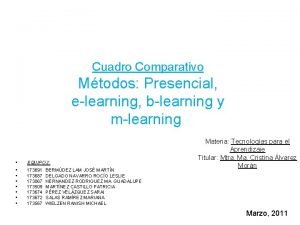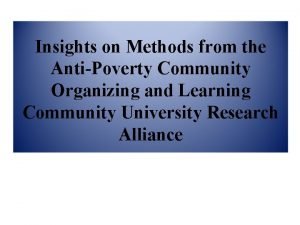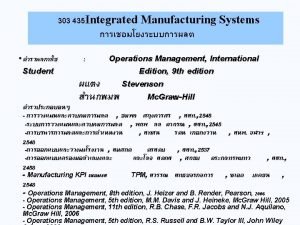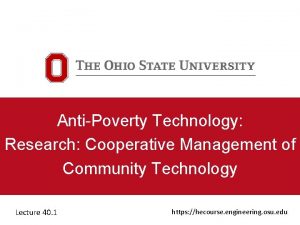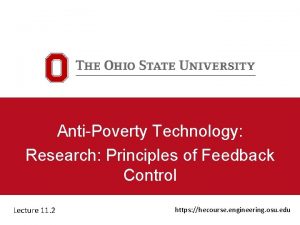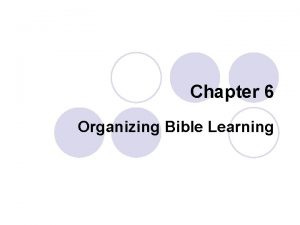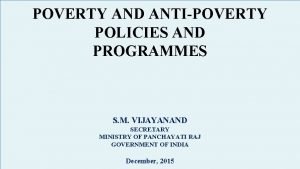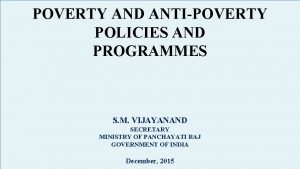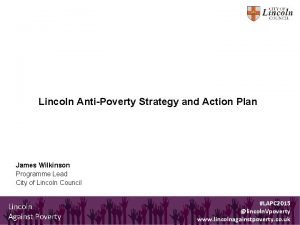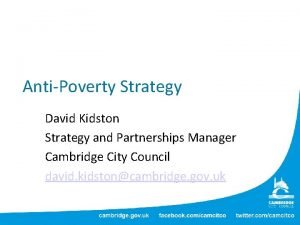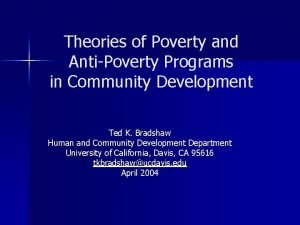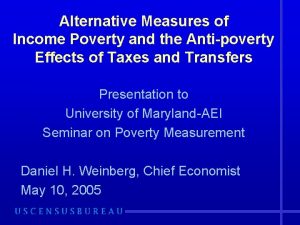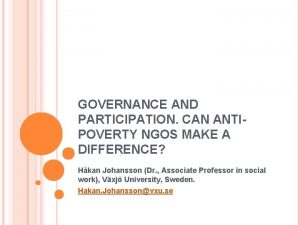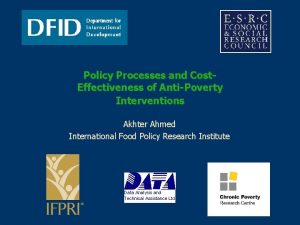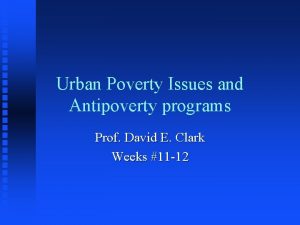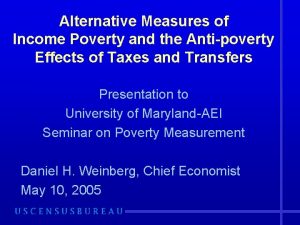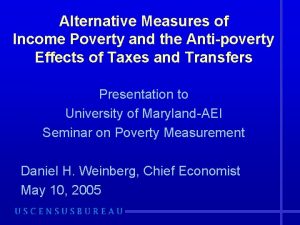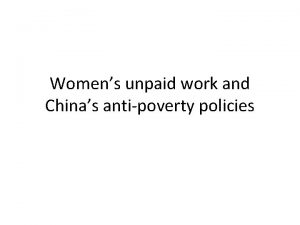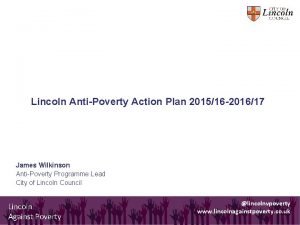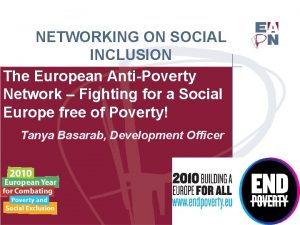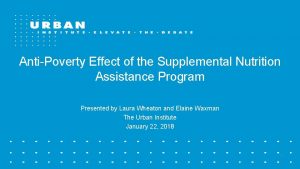Research in AntiPoverty Organizing and Learning in the






















- Slides: 22

Research in Anti-Poverty Organizing and Learning in the GTA: A Participatory Approach 5 year project, SSHRC/CURA funded Community-University partnership

Anti-Poverty Community Organizing & Learning: Goals contribute to local neighbourhood capacity to engage in antipoverty work (however they define it); help build links between community anti-poverty initiatives across the Greater Toronto Area; build understanding of the role of community-led organizing in the broader processes of positive social, political and economic change; expand the base of research/knowledge on the role of informal learning and popular education in anti-poverty work and social movement development.

Research exists on. . Poverty Indicators Impact Contributing factors E. g. Canada’s Economic Apartheid - Galabuzzi Anti-Poverty Initiatives Policies Organizations Movements Strategic responses

Research Questions: Learning & Activism . . . how and why do people get involved in anti-poverty organizing? . . . why do they stay involved? . . . why do they stop being involved? . . . why do some people never get involved in community organizing in the first place?

Conceptual Framework Popular Education: Planned educational efforts within organized campaigns that build in a systematic way from community members’ experience. Equity in Anti- Poverty Activism: Anti- Poverty Action Research: The study of antipoverty action by participantresearchers involved in campaigns themselves. Who people are matters to how they learn to become activists. Informal Learning: Learning that occurs in everyday life of campaigning and community life. Social Networks: The patterns of social relationships between individuals and groups. Conditions of Anti- Poverty Activism: Cultural, Political, Economic

Research Approach Survey Case Studies 400 surveys 8 case studies 8 neighbourhoods (50 each) 8 neighbourhoods(Black Creek, Flemingdon Park, Weston, Mount Dennis, Regent Park, North Scarborough, East Scarborough, Central Toronto multi-neighbourhood) 5 languages (Urdu, Chinese, Spanish, Arabic, English) Conducted by Communitybased Researchers Snowball method Community-initiated activist projects with research component

Four broad areas of organizing Housing Food Security Education Employment

APCOL Partners Association of Community Organizations for Reform Now (ACORN), Black Action Defense Committee, Canadian Centre for Policy Alternatives, Chinese Canadian National Council (Toronto), Community Social Planning Council of Toronto, Downtown East Community Development Collective, Labour Community Services (Toronto), Make Poverty History, National Anti-Poverty Organization, Toronto and York Region Labour Council, Toronto Community Housing Corporation, United Way Canada, Food Share. University of Toronto, Ryerson, York University, George Brown College


Participatory Action Research (PAR) At all levels of decision-making and research gathering, including survey and case study teams Emphasis on popular education model of learning Training for community organizers and animators focused on experiential and transformative learning Informal learning between researchers and participants is evident throughout the project Opportunities for bridges between community and academia enrich both research and organizing efforts

APCOL City-wide Anti-Poverty Survey



APCOL Case Studies

Theme Area (Year) Case Study Coordinating Community Organization Co-Leads Housing (Year 1) Case 1: KGO Community Housing Campaign Health/Nutrition (Year 1) Case 2: Multi-Neighborhood Health/Nutrition Campaign Food Share Toronto Good Jobs (Year 2) Case 3: St. Jamestown Pre. Apprenticeship Initiative George Brown College Housing (Year 3) Case 4: Weston Neighbourhood Housing Campaign Association of Community Organizations for Reform Now (ACORN) Case 7: Mount Dennis Neighbourhood Youth Campaign Community Social Planning Council of Toronto Case 5: Multi-Neighborhood Living Wage Campaign Toronto and York Region Labour Council Case 6: Regent Park Neighbourhood ‘First Generation’ Educational Completion Initiative Downtown East Community Coalition & George Brown College Case 8: Black Creek Neighbourhood Health/Nutrition Campaign York University Community Outreach Centre Education & Economy (Year 3) Good Jobs (Year 4) Education & Economy (Year 4) Health/Nutrition (Year 5) Community Social Planning Council of Toronto

Community-University Partnership Developing the research project together Steering Committee (e. g. Food. Share, Labour Council, CORD, CCNC and more) Survey Committee (e. g. CCPA, ACORN. . . ) Case Studies and Trustee Organizations (e. g. SPT. . . ) Neighborhood-based Residents (Survey and Case Study work) Collaborative Data Analysis

Participation Action Research as Community based research Advantages of CBR: Community initiative is central from subject to participant status Capacity building Collaboration Varied research methods Action outcomes Ethical practices Community relevance

Kingston Galloway – Orton Park East Scarborough “Priority” Neighbourhood Case study focused on housing issues and the implementation of a local housing strategy Local organizations: Residents Rising and Storefront Diverse approaches to community activism “Learning in action” Informal discussion with activists

Omar: With ten million dollars where would poverty be? I feel like if you do that it might create construction jobs: Lots of big buildings and things. But then this neighbourhood would be just some other downtown then. So, I think: What do we really want? We want to live in peace. In the right place where, I dunno. . . Some nature, some people, and some simple things. Alice: Yeah simple things! That’s what I want. [For instance] I like our market. Our Festival Market. It’s green. You see the kids playing. You watch the seniors just sit and gather. That’s what it is for me when I think of anti-poverty. . . Like me for instance, I do volunteer work around the neighbourhood. And I can’t seem to say no. I like doing it. . . But I’m living on a month on what I used to make in a week. And I’ve been successful at it for six years, seven years. It’s wearing me down. . . But then again I can’t see me getting too burnt out with this because I love it. I feed off it. . . For me, it’s when my friend went through a tough thing this week. I say, “Call me. If you need to talk, just call me”. And that’s where [anti-poverty] starts. . . I think a problem shared is a problem cut in half. It doesn’t solve the problem, but at least you can get to where the action is!

Capacity Building in KGO Trainings and workshops on poverty & local organizing strategies Political action: Housing consultation & MPP meetings Outreach & campaign development Existing social networks: Community Speaks & the Market Service delivery & Community empowerment


www. apcol. ca
 Cuadro comparativo de e-learning b-learning y m-learning
Cuadro comparativo de e-learning b-learning y m-learning Hát kết hợp bộ gõ cơ thể
Hát kết hợp bộ gõ cơ thể Bổ thể
Bổ thể Tỉ lệ cơ thể trẻ em
Tỉ lệ cơ thể trẻ em Chó sói
Chó sói Tư thế worm breton
Tư thế worm breton Alleluia hat len nguoi oi
Alleluia hat len nguoi oi Các môn thể thao bắt đầu bằng tiếng nhảy
Các môn thể thao bắt đầu bằng tiếng nhảy Thế nào là hệ số cao nhất
Thế nào là hệ số cao nhất Các châu lục và đại dương trên thế giới
Các châu lục và đại dương trên thế giới Cong thức tính động năng
Cong thức tính động năng Trời xanh đây là của chúng ta thể thơ
Trời xanh đây là của chúng ta thể thơ Cách giải mật thư tọa độ
Cách giải mật thư tọa độ 101012 bằng
101012 bằng Phản ứng thế ankan
Phản ứng thế ankan Các châu lục và đại dương trên thế giới
Các châu lục và đại dương trên thế giới Thơ thất ngôn tứ tuyệt đường luật
Thơ thất ngôn tứ tuyệt đường luật Quá trình desamine hóa có thể tạo ra
Quá trình desamine hóa có thể tạo ra Một số thể thơ truyền thống
Một số thể thơ truyền thống Cái miệng bé xinh thế chỉ nói điều hay thôi
Cái miệng bé xinh thế chỉ nói điều hay thôi Vẽ hình chiếu vuông góc của vật thể sau
Vẽ hình chiếu vuông góc của vật thể sau Nguyên nhân của sự mỏi cơ sinh 8
Nguyên nhân của sự mỏi cơ sinh 8
